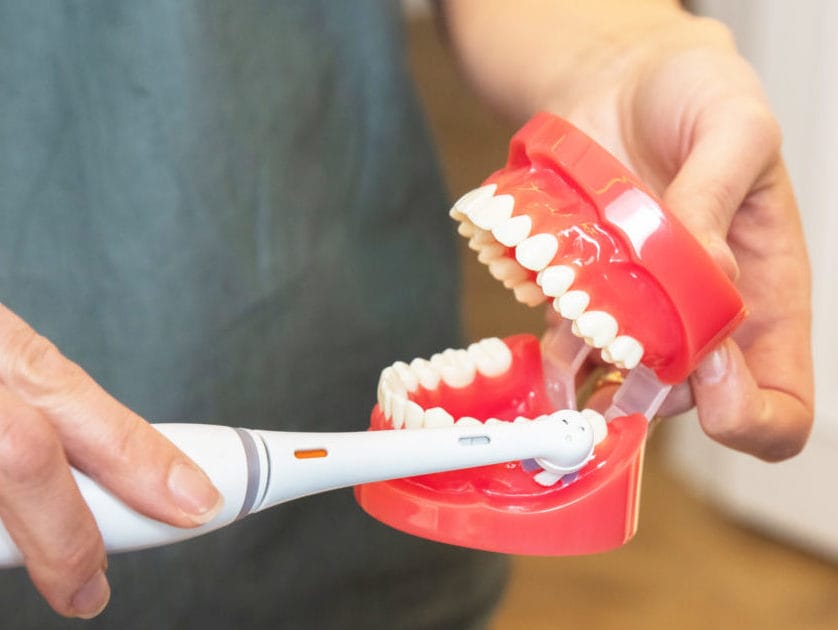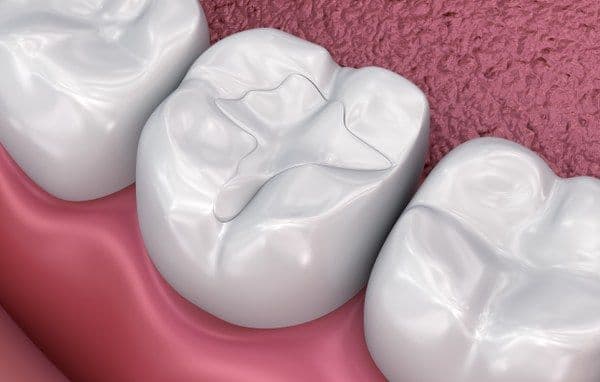Dental Fillings in London
Dental fillings are a very common procedure used to restore teeth that have become decayed or broken.

Treatment
30+ minutes per filling

Price
From £250

Team Experience
50+ years

Recovery Time
3 hours

Google Rating
★★★★★ (4.9)
Examples of our work
Dental fillings are essential for restoring teeth affected by decay or minor damage, helping to preserve tooth structure and prevent further issues. At Wimpole Street Dental Clinic, our fillings case studies demonstrate how we use durable, tooth-colored materials to seamlessly blend with each patient’s natural smile. Each case reflects our dedication to minimally invasive techniques and lasting results that ensure a healthy, confident smile.

Dental fillings do exactly that: they fill a cavity in a tooth. Cavities are caused by tooth decay but usually go unnoticed by the patient. If left untreated, they will end up destroying the whole tooth and early intervention is, most of the time, preferable. Once the decayed tissue has been removed by the dentist, the remaining space is then immediately restored, or filled, by a dental filling material.
Fillings are also called direct restorations, because they restore the teeth directly, in one visit. For larger cavities, the dentist may suggest indirect restorations, such as inlays or onlays, which take place in 2 visits.
Composite Fillings
Composite fillings are sometimes called ‘white fillings’ as they are made of a material that can be used to match the natural colour of the tooth enamel, making them practicality undistinguishable. Composite fillings are made from a mixture of glass and resin and although they aren’t as strong or hard-wearing as ceramic, gold or amalgam fillings, for smaller cavities they are often viewed as preferable as they are more conservative and less expensive.
Gold Fillings
Gold fillings are sometimes chosen for functional reasons. They are incredibly strong and have exceptional durability lasting between 20-40 years. Nowadays, we rarely recommend gold fillings as they are matched or even outperformed by modern ceramics.
Amalgam Fillings
Amalgam fillings, also known as ‘silver fillings’, used to be the most common type of filling and are made from a variety of different metallic materials including mercury. Silver in colour, amalgam fillings offer longevity and durability however over time they may cause serious cracks inside the teeth, which can lead to significant problems. Their toxicity is also a concern and that is why modern dentistry has moved away from this material.
Cement Fillings
If a dental cavity needs to be filled as an emergency, cement (mostly glass ionomer cement) can be used. They are, however, only for temporary use for a couple of weeks and need to be replaced by a composite or porcelain filling.
Who is suitable for fillings?
Most patients are suitable for fillings as they are relatively straightforward to undertake and provide long-term protection to teeth that have suffered from decay. You may notice that the tooth is not okay if you feel that it is slightly broken or particularly sensitive to colds or sweets. But cavities actually can be undetected by the patient until the very last stages so it requires an early diagnosis in order to save as much healthy tooth substance as possible.
It is important that you attend the dentist regularly for check-ups so they can check the health of your teeth and look for tooth decay that could lead to enamel damage and ultimately, a cavity. Undertaking a robust and regular oral hygiene routine (such as brushing and flossing regularly) and being careful with the diet will help protect against decay. Catching tooth decay at the earliest stages can often allow the patient to prevent further damage, meaning a filling will not be required.
Our clinical priority is saving teeth wherever possible so we will evaluate the best options for you and discuss them with you in as much detail as you need.
Meet your award-winning Fillings dentist and team…
- We have over 75+ years of combined dentistry experience across our specialist team.
- 10,000+ treatments performed and counting.
- We are leaders in the dental industry – we regularly teach, lecture and publish our research work internationally.
Our Expertise
Undergoing dental treatment can often be a daunting and uncomfortable experience, but at our clinic, we prioritize making this experience as comfortable and stress-free as possible. Our team of highly skilled and experienced dentists provides care that is not only effective but also empathetic. Their expertise and rigorous approach in dental procedures ensure that every visit to our clinic is as smooth and reassuring as it can be. In fact, some of our patients have even described their treatment experiences as surprisingly relaxing!
One of the key aspects of our dental care is the emphasis on the longevity of the treatment and, most importantly, the preservation of your existing healthy tooth structure. Our dentists employ state-of-the-art techniques and materials to ensure that every procedure contributes to the long-term health and stability of your teeth.
Additionally, our clinic takes great pride in the transparency and educational aspect of our dental care. Our dentists meticulously document each step of the treatment process using intra-oral photography. This not only allows us to maintain a high standard of care but also provides you, the patient, with a unique opportunity to view and understand the different stages of your treatment. Seeing the detailed images of your dental procedures can be an enlightening experience, giving you a deeper insight into the care and precision that goes into every aspect of your dental health journey with us.

HELEN LI
Wimpole Street Dental has the highest most ethical standard of work, personable approach, clear and safe procedures, top notch excellence and reliability in treatment provided with utmost professionalism from crème de la crème world class specialists all under one roof.
What happens during a dental filling appointment?
Please be advised that tooth decay does not cause pain until it reaches an advanced stage, so the earlier a tooth cavity can be identified the better before deep-reaching tooth decay (possibly requiring root canal treatment) sets in. This is why we encourage all our dental patients to see their dentist for a regular check-up twice a year.
Consultations with our dentists will involve looking out for oral cancer, gum disease and, of course, tooth decay. This can be diagnosed visually – with high magnification and trans-illumination – and with the help of state-of-the-art X-ray technology. Experience and the best imaging devices will help us determine if the tooth requires a dental filling.
Take your first step with Wimpole Street Dental Clinic
Discover the path to a brighter smile with Wimpole Street Dental Clinic! Our team of skilled professionals utilizes advanced technology to provide personalised dental care in a comfortable setting.















Updated content
Written by: Dr Raul Costa
Medically reviewed by: Prof Dr Christian Mehl
New page design
Written by: Prof Dr Christian Mehl
Medically reviewed by: Dr Raul Costa
Author biography added
Written by: Prof Dr Christian Mehl
Medically reviewed by: Dr Raul Costa
Original content created
Written by: Prof Dr Christian Mehl
Medically reviewed by: Dr Raul Costa
Wimpole St Dental Clinic has strict sourcing guidelines and relies on peer-reviewed studies, academic research institutions, and medical associations. We avoid using tertiary references. You can learn more about how we ensure our content is accurate and current by reading our editorial policy.
- Tan SS, Ken Redekop W, Rutten FF. Costs and prices of single dental fillings in Europe: a micro-costing study. Health Econ. 2008 Jan;17(1 Suppl):S83-93. doi: 10.1002/hec.1326. PMID: 18186032.
- Worthington HV, Khangura S, Seal K, Mierzwinski-Urban M, Veitz-Keenan A, Sahrmann P, Schmidlin PR, Davis D, Iheozor-Ejiofor Z, Rasines Alcaraz MG. Direct composite resin fillings versus amalgam fillings for permanent posterior teeth. Cochrane Database Syst Rev. 2021 Aug 13;8(8):CD005620. doi: 10.1002/14651858.CD005620.pub3. PMID: 34387873; PMCID: PMC8407050.
- Agnihotry A, Fedorowicz Z, Nasser M. Adhesively bonded versus non-bonded amalgam restorations for dental caries. Cochrane Database Syst Rev. 2016 Mar 8;3(3):CD007517. doi: 10.1002/14651858.CD007517.pub3. PMID: 26954446; PMCID: PMC6599857.
- Rasines Alcaraz MG, Veitz-Keenan A, Sahrmann P, Schmidlin PR, Davis D, Iheozor-Ejiofor Z. Direct composite resin fillings versus amalgam fillings for permanent or adult posterior teeth. Cochrane Database Syst Rev. 2014 Mar 31;(3):CD005620. doi: 10.1002/14651858.CD005620.pub2. Update in: Cochrane Database Syst Rev. 2021 Aug 13;8:CD005620. PMID: 24683067.















